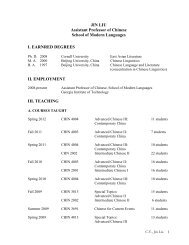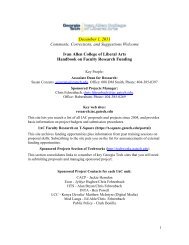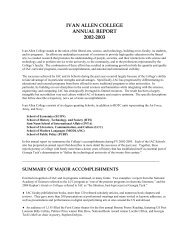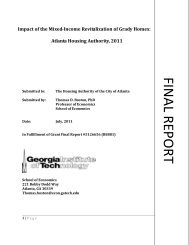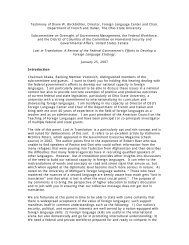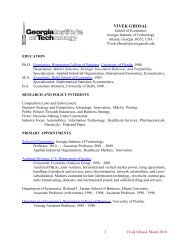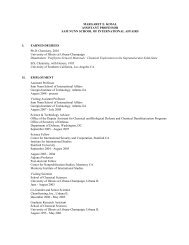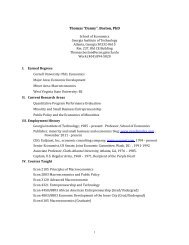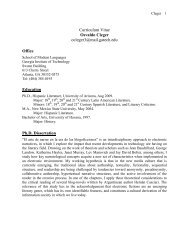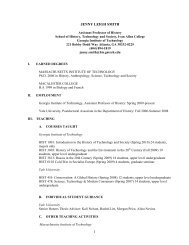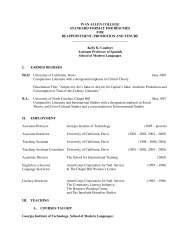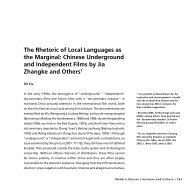Richard Barke, richard - Ivan Allen College - Georgia Institute of ...
Richard Barke, richard - Ivan Allen College - Georgia Institute of ...
Richard Barke, richard - Ivan Allen College - Georgia Institute of ...
You also want an ePaper? Increase the reach of your titles
YUMPU automatically turns print PDFs into web optimized ePapers that Google loves.
Faculty with Research Interests in<br />
Health and Biomedical Research<br />
<strong>Richard</strong> <strong>Barke</strong>, <strong>richard</strong>.barke@pubpolicy.gatech.edu<br />
Dr. <strong>Richard</strong> <strong>Barke</strong> is an Associate Pr<strong>of</strong>essor in the School <strong>of</strong> Public Policy. He received<br />
his BS in Physics from the <strong>Georgia</strong> <strong>Institute</strong> <strong>of</strong> Technology and his MA and PhD in<br />
Political Science from the University <strong>of</strong> Rochester. His research interests focus on the<br />
roles <strong>of</strong> politics within science, and <strong>of</strong> science within politics. Dr. <strong>Barke</strong> has written<br />
about topics such as the political behavior <strong>of</strong> scientific disciplines, the impact <strong>of</strong><br />
university curricula on the organization and advancement <strong>of</strong> scientific knowledge, the<br />
politics <strong>of</strong> science budgeting in Congress, and how scientists translate scientific findings<br />
into policy recommendations. Currently (2004-2005), he is focusing on the decision<br />
making processes by which science and ethics are reconciled in the regulation <strong>of</strong><br />
research, particularly research involving human subjects.<br />
Roberta Berry, roberta.berry@pubpolicy.gatech.edu<br />
Dr. Roberta M. Berry is Associate Pr<strong>of</strong>essor in the School <strong>of</strong> Public Policy and Director,<br />
Law, Science & Technology Program. Her research focuses on the legal, ethical, and<br />
policy implications <strong>of</strong> life sciences research and biotechnologies. In 2001, Pr<strong>of</strong>. Berry<br />
was named Outstanding Faculty Member by the <strong>Georgia</strong> Tech Student Government<br />
Association. In 2004, she received the <strong>Ivan</strong> <strong>Allen</strong> Jr. Faculty Legacy Award and in 2005<br />
she received the Class <strong>of</strong> 1940 W. Howard Ector Outstanding Teacher Award.<br />
Tibor Besedes, tibor.besedes@econ.gatech.edu<br />
Dr. Tibor Besedes is an Assistant Pr<strong>of</strong>essor in the School <strong>of</strong> Economics. He received his<br />
BSc in Economics from Texas Christian University, his MA and PhD in Economics from<br />
Rutgers University. Previously he was an Assistant Pr<strong>of</strong>essor in the School <strong>of</strong> Economics<br />
at Louisiana State University. His research interests encompass International trade,<br />
decision making, experimental economics, social networks, and industrial organization.<br />
In addition to English, Pr<strong>of</strong>essor Besedes also speaks Croatian and German.<br />
Mike Best, mikeb@cc.gatech.edu<br />
Dr. Michael L. Best is Assistant Pr<strong>of</strong>essor with the Sam Nunn School <strong>of</strong> International<br />
Affairs at <strong>Georgia</strong> Tech and Adjunct Assistant Pr<strong>of</strong>essor with their <strong>College</strong> <strong>of</strong> Computing<br />
where he also is core faculty with the GVU center. In addition he is a Fellow <strong>of</strong> the<br />
Berkman Center for Internet and Society at Harvard. Michael is co-founder and Editorin-Chief<br />
<strong>of</strong> Information Technologies and International Development published by the<br />
MIT Press. He serves as a frequent consultant to the World Bank, ITU, and USAID. He<br />
holds a Ph.D. from MIT and has served as Director <strong>of</strong> Media Lab Asia in India and head<br />
<strong>of</strong> the eDevelopment group at the MIT Media Lab. His research focuses on the role <strong>of</strong><br />
computers and communication in social, economic, and political development. In<br />
particular, he studies the Internet and Internet enabled services, mobile telephony, and<br />
other communication and IT services in low-income countries <strong>of</strong> Africa and South Asia.<br />
His current projects include studies <strong>of</strong> terrestrial wireless infrastructure, human/ computer<br />
interaction in Africa and Asia, and new approaches in monitoring and evaluation. He is<br />
also studying the role <strong>of</strong> the Internet in post-conflict settings and as a tool for peace,
econciliation, security, and democratization. His work encompasses the engineering <strong>of</strong><br />
new technologies, public policy interventions, as well as social and economic<br />
assessments.<br />
Michelle Dion, mdion@gatech.edu<br />
Dr. Michelle Dion arrived at <strong>Georgia</strong> Tech as an Assistant Pr<strong>of</strong>essor in the Sam Nunn<br />
School <strong>of</strong> International Affairs in 2002. She specializes in the political economy <strong>of</strong> social<br />
policy in the Sam Nunn School <strong>of</strong> International Affairs. Her research has been published<br />
in Latin American Politics and Society, Mexican Studies, Estudios Sociológicos, Foro<br />
Internacional, and Politica y Gobierno. She is currently finishing a book on the political<br />
development <strong>of</strong> welfare in Mexico since the Mexican Revolution. She has completed<br />
over three years <strong>of</strong> research in Mexico funded by the Social Science Research Council<br />
and the Fulbright program. She was recently a Visiting García Robles-Fulbright Pr<strong>of</strong>essor<br />
at the Centro de Investigación y Docencia Económicas (CIDE) in Mexico City. She<br />
teaches undergraduate and graduate courses on Latin American politics, international<br />
political economy, and research methodology.<br />
Michael H<strong>of</strong>fman, michael.h<strong>of</strong>fmann@pubpolicy.gatech.edu<br />
Dr. Michael H<strong>of</strong>fmann is an Associate Pr<strong>of</strong>essor in the School <strong>of</strong> Public Policy. His<br />
research focuses on the role <strong>of</strong> diagrammatic representations as mediating tools in<br />
conflict resolution processes. Based on the observation that resolving conflicts is mainly<br />
hindered by opposing interpretations <strong>of</strong> what is going on in a conflict, and by different<br />
habits <strong>of</strong> thinking, the question is: How to change thinking processes and interpretations?<br />
Using Charles S. Peirce's concept <strong>of</strong> "diagrammatic reasoning" to answer this question,<br />
his central thesis is that the only rational way to change thinking is by reflecting on<br />
possible representations <strong>of</strong> this thinking. In this way, different perspectives on a conflict<br />
can become an object <strong>of</strong> exploration in jointly conducted negotiation processes.<br />
Angela Labarca, angela.labarca@modlangs.gatech.edu<br />
Dr. Angela Labarca was hired as Full Pr<strong>of</strong>essor (1991) to create the Spanish LBAT<br />
program. At present, she directs the Madrid portion and the Valencia programs in Spain.<br />
Dr. Labarca is GT's only Hispanic female Full Pr<strong>of</strong>essor. She has several articles,<br />
chapters in volumes, and two co-edited volumes on the psycholinguistics <strong>of</strong> second<br />
language acquisition, reading and testing. She also has written or co-authored more than<br />
18 textbooks for Spanish and English teaching as well as standardized Rasch-analyzed<br />
language tests. She teaches Scientific and Business Spanish, Hispanic Culture through<br />
Literature, and US Spanish: Language and Cultures. She has taught at the Universities <strong>of</strong><br />
Rome, Seville and S<strong>of</strong>ia, and has trained instructors in the US, Argentina, Bulgaria,<br />
Germany, and Italy.<br />
Aaron Levine, aaron.levine@pubpolicy.gatech.edu<br />
Dr. Aaron D. Levine is an Assistant Pr<strong>of</strong>essor in the School <strong>of</strong> Public Policy. He received<br />
his BA in Biology from the University <strong>of</strong> North Carolina at Chapel Hill, his M.Phil in<br />
Biological Sciences from the University <strong>of</strong> Cambridge, and his PhD in Public Affairs<br />
from Princeton University. His research interests include the impact <strong>of</strong> public policy on<br />
biomedical/biotechnology research, human embryonic stem cell research policy,
geographic distribution <strong>of</strong> scientific research, formation and functioning <strong>of</strong> international<br />
research collaborations, and intellectual property rights. His latest book, Cloning: A<br />
Beginner's Guide (Oxford, England, 2007), is an introduction to cloning and embryonic<br />
stem cell science for non-specialists.<br />
Anne Pollock, anne.pollock@lcc.gatech.edu<br />
Dr. Ann Pollock is an Assistant Pr<strong>of</strong>essor in the School <strong>of</strong> Literature, Communication,<br />
and Culture. She received her PhD in the history and social study <strong>of</strong><br />
science from MIT. She joins <strong>Georgia</strong> Tech after spending a year as a<br />
guest lecturer with the Rice University department <strong>of</strong> anthropology.<br />
The working title <strong>of</strong> her current book manuscript is “Medicating<br />
Race: Heart Disease and Durable Preoccupations with Difference.”<br />
Pollock’s research focuses on biomedicine and culture, with a special<br />
interest in how pharmaceuticals and heart disease categories have<br />
intersected with racial and gender identities in the United States since<br />
World War II.<br />
John Tone, john.tone@hts.gatech.edu<br />
Dr. John Lawrence Tone came to the <strong>Georgia</strong> <strong>Institute</strong> <strong>of</strong> Technology in 1990 as a<br />
Pr<strong>of</strong>essor in the School <strong>of</strong> History, Technology, and Society. He specializes in European<br />
and military history in the School <strong>of</strong> History, Technology, and Society. He is also the<br />
Associate Dean <strong>of</strong> Undergraduate Studies effective January 1, 2008. He has written<br />
several articles and books on Spanish and Cuban history, including The Fatal Knot: The<br />
Guerrilla War in Navarre and the Defeat <strong>of</strong> Napoleon in Spain (1995), La guerrilla<br />
española (1999), and War and Genocide in Cuba (2006). His current research is on the<br />
history <strong>of</strong> yellow fever. He has received grants from the Fulbright Foundation, the<br />
National Endowment for the Humanities, and the American Philosophical Society. He<br />
has taught undergraduate courses on Europe since the Renaissance, Nineteenth-Century<br />
Europe, Twentieth-Century Europe, Columbus and the Conquest <strong>of</strong> America, The French<br />
Revolution and Napoleon, The Enlightenment, Intellectual History, Modern Spain,<br />
Modern Cuba, and Research Methods, and graduate seminars on Comparative<br />
Revolutions and The Comparative History <strong>of</strong> Labor, Industrialization, and Technology.<br />
The Fatal Knot was a selection <strong>of</strong> the History Book Club and received the Literary Prize<br />
<strong>of</strong> the International Napoleonic Society in 1999. He was inducted as a Fellow <strong>of</strong> the<br />
International Napoleonic Society in that same year.<br />
Ruth Uwaifo, ruth.uwaifo@econ.gatech.edu<br />
Dr. Ruth O. Uwaifo Oyelere received her Ph.D. in Agriculture and Resource Economics<br />
from the University <strong>of</strong> California, Berkeley. She joined the <strong>Georgia</strong> Tech faculty as an<br />
Assistant Pr<strong>of</strong>essor <strong>of</strong> Economics in fall 2006. Her research interests are in Development<br />
Economic, Education, Labor, and Health Economics. Her present work in development<br />
economics has centered on trying to precisely estimate returns to education in an African<br />
country while also trying to understand recent low returns to education in many African<br />
countries. She is presently also evaluating the impact on the US <strong>of</strong> the diversity visa<br />
lottery immigration program and possible alternatives to this program.



